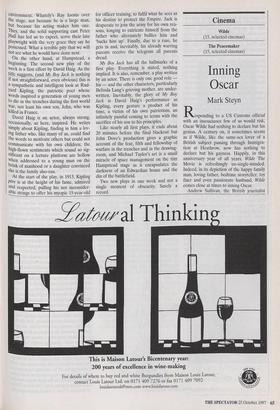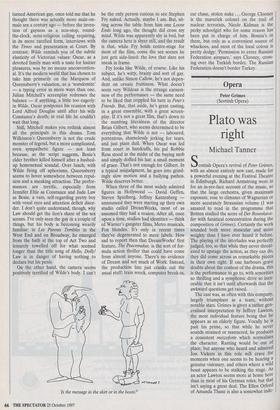Cinema
Wilde (15, selected cinemas)
Inning Oscar
Mark Steyn
Responding to a US Customs official with an insouciance few of us would risk, Oscar Wilde had nothing to declare but his genius. A century on, it sometimes seems as if Wilde, like the same-sex lover of a British subject passing through Immigra- tion at Heathrow, now has nothing to declare but his gayness. Happily, in this anniversary year of all years, Wilde The Movie is refreshingly un-single-minded. Indeed, in its depiction of the happy family man, loving father, bedtime storyteller, toy fixer and even passionate husband, Wilde comes close at times to inning Oscar.
Andrew Sullivan, the British journalist turned American gay, once told me that he thought there was actually more male-on- male sex a century ago — before the inven- tion of gayness as a non-stop, round- the-clock, semi-religious calling requiring, in its more rarefied form, interviews with the Times and presentation at Court. By contrast, Wilde reminds you of the subtle elasticity of Victorian values: Oscar, as a devoted family man with a taste for hairier pleasures, was by no means unconvention- al. It's the modern world that has chosen to take him primarily on the Marquess of Queensberry's valuation, as a `somdomite' — a typing error in more ways than one. Julian Mitchell's screenplay redresses the balance — if anything, a little too eagerly: in Wilde, Oscar postpones his reunion with Lord Alfred Douglas until after his wife Constance's death; in real life he couldn't wait that long.
Still, Mitchell makes you rethink almost all the principals in this drama. Tom Wilkinson's Queensberry is not the crude monster of legend, but a more complicated, even sympathetic figure — not least because, as the script suggests, Bosie's elder brother killed himself after a hushed- up homosexual scandal. Over lunch, with Wilde firing off aphorisms, Queensberry seems to hover somewhere between repul- sion and a sneaking attraction. The perfor- mances are terrific, especially from Jennifer Ehle as Constance and Jude Law as Bosie, a vain, self-regarding pretty boy with venal eyes and attention deficit disor- der. I don't quite understand, though, why Law should get the lion's share of the sex scenes. I've only seen the guy in a couple of things, but his body is becoming wearily familiar: in Les Parents Terribles in the West End and on Broadway, he emerged from the bath at the top of Act Two and leisurely towelled off for what seemed longer than the title song of Hello, Dolly! Law is in danger of having nothing to declare but his penis.
On the other hand, the camera seems positively terrified of Wilde's body. I can't be the only person curious to see Stephen Fry naked. Actually, maybe I am. But, sit- ting across the table from him one Loose Ends long ago, the thought did cross my mind. Wilde was apparently shy in bed, but the camera here is shyer still, and the result is that, while Fry holds centre-stage for most of the film, come the sex scenes he just gets side-lined: the love that dare not sneak in frame.
Fry looks like Wilde, of course. Like his subject, he's witty, brainy and sort of gay. And, unlike Simon Callow, he's not depen- dent on ornate fruitiness. What doesn't seem very Wildean is the strange earnest- ness of the performance — the same need to be liked that crippled his turn in Peter's Friends. But, that aside, he's great casting, in a great ensemble, with a great screen- play. If it's not a great film, that's down to the numbing literalness of the director Brian Gilbert, who seems determined to be everything that Wilde is not — laboured, portentous, shamelessly jerking for tears, and just plain dull. When Oscar was led from court in handcuffs, his pal Robbie Ross stood in the midst of the baying mob and simply doffed his hat: a small moment of grace. That's not enough for Gilbert. In a typical misjudgment, he goes into grind- ingly slow motion and a bullying pathos. Wilde deserves better.
When three of the most widely admired figures in Hollywood — David Geffen, Steven Spielberg, Jeffrey Katzenberg announced they were starting up their own studio called DreamWorks, most of us assumed they had a reason. After all, once upon a time, studios had identities — think of Warner's gangster films, Metro musicals, Fox blondes. It's only in recent times they've degenerated to mere labels. How sad to report then that DreamWorks' first feature, The Peacemaker, is the sort of for- mula action thriller that could have come from almost anyone. There's no evidence of Dream and not much of Work. Instead, the production line just cranks out the usual stuff: train wreck, computer break-in,
'Is the message in the skirt or in the boots?' car chase, stolen nuke ... George Clooney is the maverick colonel on the trail of nuclear terrorists, Nicole Kidman is the perky schoolgirl who for some reason has been put in charge of him. Bosnia's in there, but only as a convenient source of whackoes, and most of the local colour is pretty dodgy: 'Permission to enter Russian Federation airspace,' says Clooney, cross- ing over the Turkish border. The Russian Federation doesn't border Turkey.



















































































 Previous page
Previous page